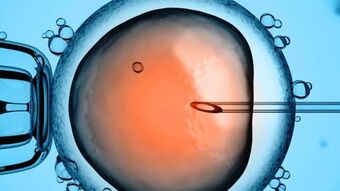Do we want to engineer our kids?

Way back in the middle of the Second World War one of the smartest men in the world wrote a little book with the weird title The Abolition of Man. One day, he said, science would give us the power to pick our children’s genes.
He certainly wasn’t “anti-science,” but he knew that science could be put to bad uses as well as good ones. The development of aeroplanes meant that London was being raided, night after night, by German bombers.
His name? C.S. Lewis.
We know Lewis best for the Narnia books, or his intro to the Christian faith Mere Christianity, or his sci-fi novels. He was also a top academic – a literature professor at Oxford and Cambridge – and what we would today call a “public intellectual” (he was a regular on BBC radio). As well as writing children’s books and teaching students, Lewis kept looking at big issues. He was thinking long and hard about the temptations that science might hold out.
As I recently wrote for the website UnHerd:
Lewis “foresaw a future science that would enable us to design our children, and their children, in perpetuity. He pointed out that this would make them the creatures of our power over the future. Our choices, however well-intentioned, will shape who they are. This is dangerous territory. Should the passing beliefs of today, good or bad, be the criteria that shape the genes of our babies, grandchildren, descendants tomorrow?” The core threat is not simply people making changing in their children’s genes, but making changes that they will pass on to their children in turn. And then their children’s children. Changes in what’s called the “germline.” Changes that will shape generations to come.
Lewis popped into my mind the other day when I was reading the Washington Post. Because what he feared, and foresaw, is starting to come true now. Today. More than 70 years later, the leading newspaper in America’s capital headlined its main editorial with these stunning words: “We have the technology to customize our babies.”
What alarmed the Washington Post was the story of a rogue Chinese scientist who decided to try and make the world’s first genetically engineered babies. (We don’t know much about what he has done, but we do know he succeeded.) His name is Dr. He, which can make reading about him a bit confusing! Fortunately, the news of Dr. He’s work has alarmed many leaders in the global scientific community. Scientists in the UK and the US and around the world are scrambling to try and prevent other rogue researchers from doing the same thing.
The problem is that the science of genetic engineering just got a lot simpler to do. A new technique has been developed that makes it both easier and faster to engineer genes than before. It has the odd name CRISPR-Cas9. Techie magazine Wired called it “The Genesis Engine.” Scientists believe it will have many benefits, some of them quite remarkable. “It could eliminate disease. It could solve world hunger. It could provide unlimited clean energy.” But, also, “It could really get out of hand.” As law professor and bioethicist Hank Greely has said: “it’s something that someone with a BS [a bachelor of science degree] and a couple thousand dollars’ worth of equipment can do. What was impractical is now almost everyday. That’s a big deal.”
The point is that – unlike, for example, nuclear technology – it could be very difficult to regulate how it is used. Its implications are enormous, but it’s small-scale science (you can build a little lab in your garage) and - for a biologist - not all that difficult to do.
So maybe we should be glad for Mr. He’s unethical experiments, because they’ve caught the attention not just of the Washington Post, but the UK’s Royal Society and its US equivalent the National Academies of Sciences. These top science bodies on both sides of the Atlantic have joined forces to write some rules. The World Health Organization has set up its own global committee. And the leading science magazine, Nature, has called for a moratorium – a complete stop, for the moment – on any work involving human embryos. Meanwhile, the Chinese government – which does not usually worry about unethical science – is embarrassed by what He did. He is apparently under house arrest.
One problem facing these science bodies is that some uses of CRISPR technology to make inheritable changes could be to cure inheritable diseases. It’s always hard to argue against people saying “if we do this we can cure people.” But sometimes we need to say: find another way. Because once we start messing around with our children’s genes we don’t know where it will stop.
Meanwhile, here in the UK the influential Nuffield Bioethics Committee (an independent group that operates as a kind of unofficial national bioethics committee) has come right out in favour of inheritable changes that have nothing to do with curing disease! They carefully say that it must be “intended to secure, and [be] consistent with, the welfare of a person who may be born as a consequence of interventions using genome edited cells.” But their report basically suggests giving the green light to efforts to change human nature – once the kinks have bee ironed out of the process and it’s safe to use. This is a very disturbing document.
What’s wrong with this way of thinking?
First, there really isn’t a bright line between “curing” and “improving” your descendants. Even Dr. He may have accidentally “improved” his embryos even though he claims he was out to cure them.
Second, any changes we decide to make – even if the “welfare” of the next generation is key, as the Nuffield report suggests – will reflect our current notions of “welfare.” Tall? Blonde? Smart? Athletic? If you’ve seen the wonderful film Gattaca, with Uma Thurman and Ethan Hawke, you’ll have some idea of what it might be like to live in a world where everyone wants perfect children, and those who have the money can pay to get them. There’s a great scene where the black doctor comments that the white parents have decided they want a white child.
Third, any intervention like this is going to be very expensive. I can just see the wealthy using it to make sure they have super-smart, super-healthy kids. It’s hard to see it being available on the NHS.
Fourth, babies aren’t “things” to be manipulated like DIY projects. They are other people. Given us by God. Bearing his image. We are to welcome them and care for them and teach them, not design them according to our own idea of perfection.
Watch Gattaca, read The Abolition of Man and think about how well-informed Christian believers can help shape what comes next!
By Nigel Cameron
Find out more
Nigel Cameron is a consultant for CARE, you can read another one of his articles on the CARE website in which he sets out why we must save doctors from pressure to kill their patients
He has also written two books for us - God and My Mobile and The Robots are Coming: Us, Them and God.




Share story
Do we want to engineer our kids?